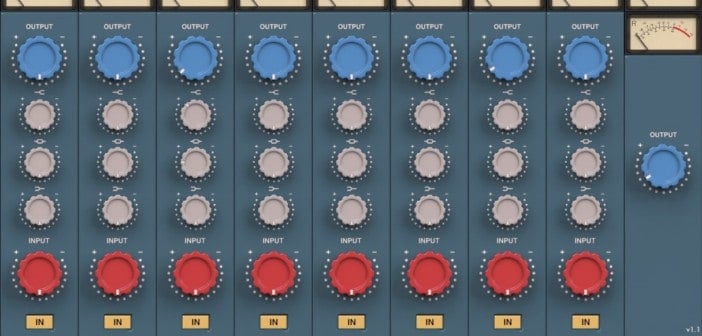Analog Obsession has released NCAR, a freeware virtual sidecar and analog summing mixer effect in VST plugin format for DAW software on PC and Mac.
NCAR is a multi-channel analog summing plugin. It emulates an eight-channel analog summing console with a three-band EQ and a preamp on each channel. The channel equalizers have three fixed frequency bands ( 110Hz, 1.6kHz, and 10kHz). Each stereo channel also features a VU meter for proper gain staging, a bypass switch, mute switch, adjustable input/output gain, and an editable text box for channel name entry.
See also: All Analog Obsession VST Plugins Are Now FREE (Donationware)The eight stereo channels are summed to a single stereo master channel. The master channel features a VU meter, an output volume control, and an editable text box. It is also possible to rout each stereo channel to a corresponding stereo output. This way, the NCAR plugin can be used as a gain staging and EQ plugin without taking advantage of the analog summing functionality.
As expected, a virtual summing plugin like NCAR will require some manual routing inside the DAW. The process can vary from one digital audio workstation to another. However, the routing procedure is pretty straightforward and well documented on the NCAR product page.
Unfortunately, due to the input and output routing limitations of the VST3 and AU plugin formats, the multi-channel version of NCAR is only available as a VST plugin. Analog Obsession has also released a single-channel version of NCAR called NCAR SE, which is available in VST3 and AU plugin formats, too.
On a related note, Analog Obsession has released several other VST plugins lately. One particularly exciting release is Konsol, a freeware console channel preamp plugin. It emulates three different console types, each with a different flavor of saturation. It seems like NCAR could work very well in tandem with Konsol.
NCAR can be downloaded entirely free of charge from Analog Obsession’s Patreon page. No signup required. Only 64-bit plugin hosts are supported. Analog Obsession plugins are free to download and use. The users can donate to Analog Obsession through their Patreon page.
More info: NCAR (6.59 MB download size, ZIP archive, 64-bit VST plugin format for Windows & macOS)
More articles:



10 Comments
Topon Das
onAnyone know if NCAR can be used with Cubase 10.5? I downloaded the plug-in, but haven’t been able to figure out the routing properly. Putting NCR on a 6.0 buss and panning the sends seems to somewhat work, but then I’m stuck with the awkward panning.
Topon Das
onGot confirmation that this doesn’t work in Cubase.
Rob
onSaw the hidden message 😃
Is it a collaboration between you and AO? Cool!
Tomislav Zlatic
onNope, a different developer. But it’s coming very soon, stay tuned! And hey, well spotted! :)
Gary
onsorry, im no expert, but what is the point of having a digital summing vst?
Vatche
onAgreed, there is no analog summing in the digital domain.
Wing Yee
onNCAR works best in a Modular App such as Minihost Modular or Element.
In Element, the following I/O configurations are available: Mono, Stereo, LCR, Quadraphonic, Surround (5.0, 5.1, 7.0, 7.1), Discrete #9-#16 (#16 = I/O x8).
Rahul Ranganath
onHas anyone else noticed the massive phase shift these plugins cause. Not to mention all the compressors from the developer have the exact same release curve when you analyse them. I find all these products unusable for those reasons. Would some more insight into what’s happening with the code. Am I doing something wrong ?
SP
onI tried it on a bunch of tracks, Kick/Snare top & bottom/ST OH/Bass/2 Gtrs/Stereo Piano, trying to do a A/B comparison and the result with the plugin on was a phasy mess. That made it pretty unusable, pitty. I was really excited about this plugin.. I am not sure if it’s a bug of some sort and except you there’s noone else talking about the phase, no info at all.
Crust Lord Algae
onMost plugins of this developer are just repackaged bits of the same wonky lines of code. The many different compressors behave very samey and the analog saturation is simple linear soft clipping for the most. Many of these plugins are extremely CPU inefficient. It’s hilarious to see how much the “audio producing community” has degraded to the point where a fancy name and a fancy GUI are enough to get your plugins into many top-20-best-plugins-lists. AO is quantity over quality, and the developer cannot even write DSP code. He uses Spice to mimick electric circuits of real units (which I’m sure he does not even have access to, given the sheer amount of plugins he released) and then translates these electronic calculations into basic, non optimized code. The results are naturally far away from real analog modelling and more guesswork than anything else.